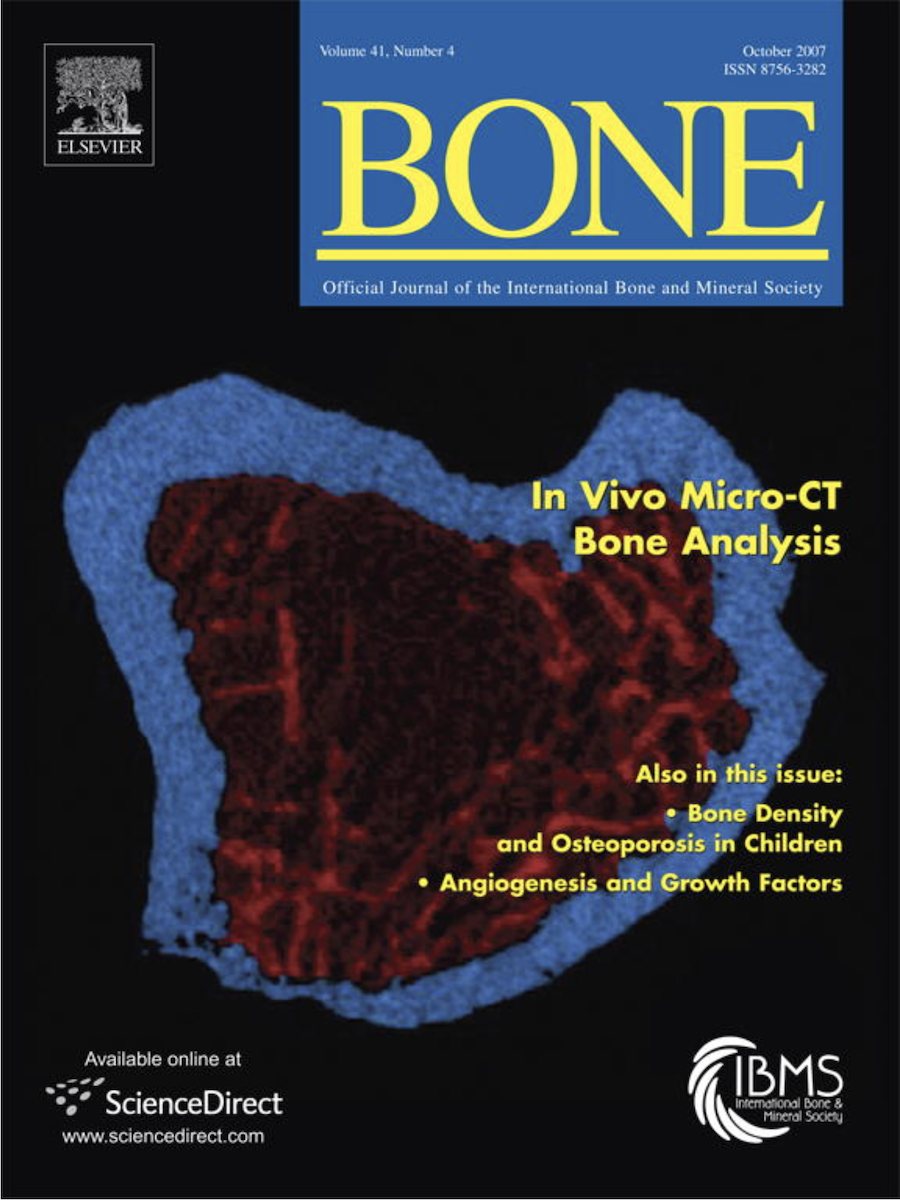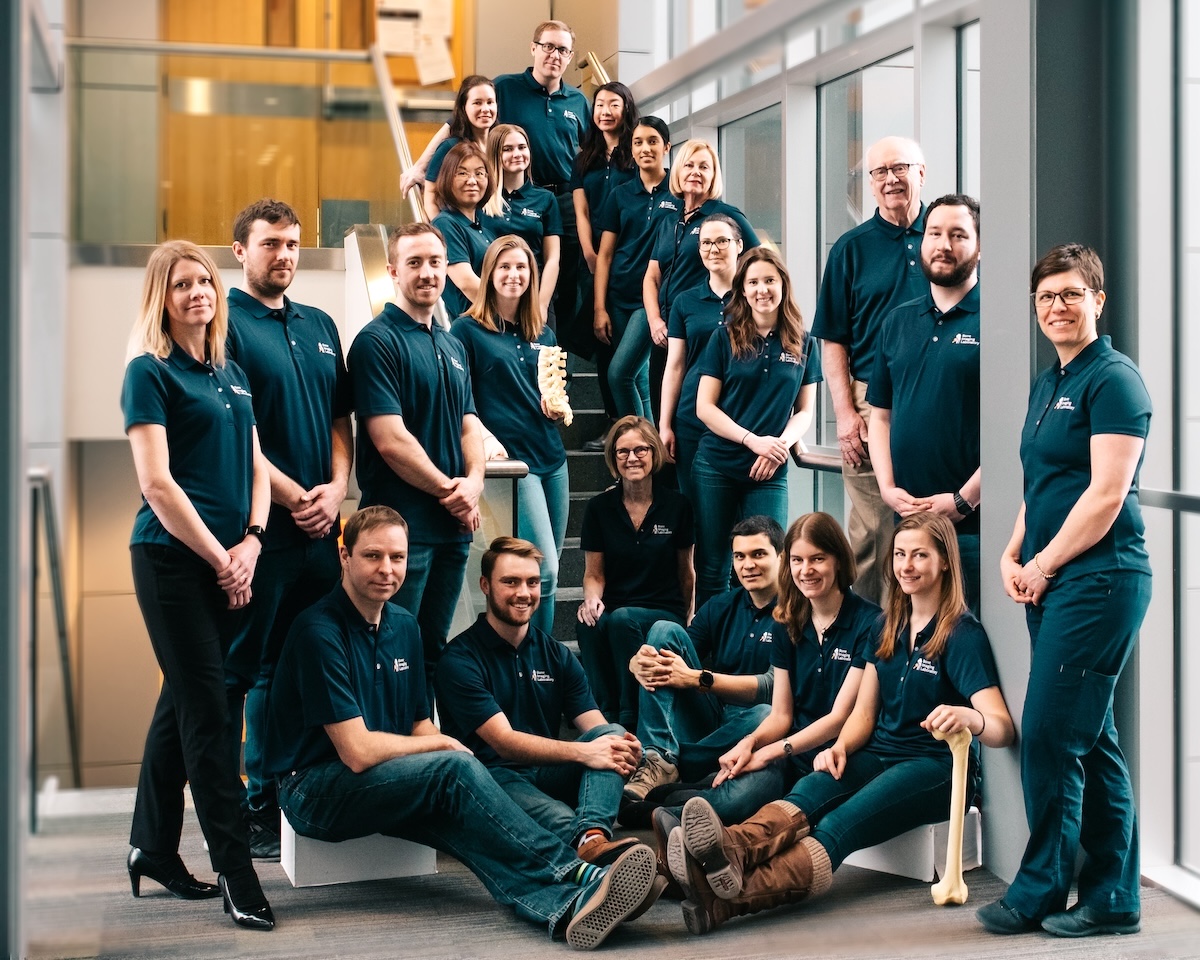About Us
The Bone Imaging Laboratory is a research team of about 20 staff and trainees led by Dr. Steven Boyd. We are based at the University of Calgary in the Cumming School of Medicine, located in the McCaig Institute for Bone and Joint Health. Dr. Boyd is a Professor in the Department of Radiology, and a member of the Image Science Division.
Research Areas
Our work is in the area of musculoskeletal health, with a focus on using advanced imaging to study prevention, diagnosis and treatment of osteoporosis or osteoarthritis:
- Bone strength. Non-invasive assessment of bone strength using high resolution computed tomography and finite element analysis.
- Multi-modal imaging. Multi-modal imaging to monitor progressive joint adaptation in the knee following an acute ligament injury.
- Stress fractures. Determining the time course of stress fracture healing by dual-energy computed tomography.
- Fracture prediction. Predicting fragility fractures of the hip and other major osteoporotic fractures by non-invasive imaging.
- Space flight. Effect of space flight on bone quality in astronauts using high-resolution imaging.
- Machine learning. Using machine learning for semantic segmentation and decision making.
- Vitamin D. Research investigating dose-dependent longitudinal effects of vitamin D supplementation on bone health.
Our Mission
To advance the detection, treatment and management of bone and joint health through medical imaging and medical image analysis. We aim to embrace inclusivity in research by realizing the core values of respect, integrity, teamwork and excellence. We strive to create an environment that is welcoming, culturally sensitive and responsive to the diverse needs of our students, faculty, staff and community.
Get Involved!
We have a vibrant training environment in the Bone Imaging Lab that includes trainees at all levels, from undergraduate, to graduate (MSc, PhD) and post-doctoral fellows.
We receive many queries about joining the lab and we try to respond to them all. To increase the odds of having a favourable reply, it is encouraged to follow the guidance below.
Success at being accepted for a research position is partly about good timing and partly about your qualifications. Although a strong CV obviously helps, there are several factors that influence the decision. Being well-rounded is highly regarded!
Postdoctoral fellows
Typically we do not have funding for postdoctoral fellows, unless otherwise noted. However, if you have your own funding, please contact us at the email at the bottom of this page. If you are interested in applying for funding, some common sources are CIHR, NSERC, and AIHS.
When contacting by email, please include the following:
- Cover letter (~1 page).
- Resume/CV providing an overview of your academic background, awards, and summary of research outputs.
- Transcripts (unofficial are fine).
Applications are accepted at any time.
Graduate students
Graduate students in the Bone Imaging Lab have undergraduate degrees in engineering (all types), kinesiology, or other science degrees. They typically enter the Biomedical Engineering Graduate Program program, but sometimes also the Faculty of Kinesiology and other departments at the Schulich School of Engineering.
Contact the lab before applying to those programs at the email at the bottom of this page. In your query, please include the following:
- Cover letter (~1 page).
- Resume/CV providing an overview of your academic background, awards, and summary of research outputs (if any).
- Transcripts (unofficial are fine).
Applications are considered 4-6 months ahead of start of program (September, January or May).
Undergraduate students
Each summer we hire undergraduate students to work in the lab. Sometimes we hire students who have just finished their first year of their degree, but most often they are students in the later part of their degree. Students typically are from programs across Canada in the areas of engineering, kinesiology or general sciences. Occasionally we hire co-op students too. Typically undergraduate students will work on a project that is overseen by graduate students or postdoctoral fellows.
If you are interested, please contact the lab at the email at the bottom of this page and include in your email the following:
- Cover letter (~1/2 page).
- Resume/CV providing an overview of your academic background, awards, and summary of research outputs (if any).
- Transcripts (unofficial are fine).
Applications for the summer term (May to August) are considered in the preceding December or January. Successful applicants will be encouraged to apply for awards, typically due at the end of January. Co-op students are considered for other times of the year.


